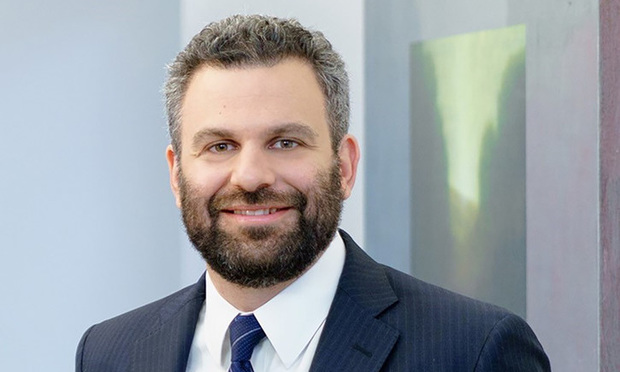Q&A: Why Keker's Ben Berkowitz is Representing Journalist Bryan Carmody Pro Bono
Keker, Van Nest & Peters partner Ben Berkowitz says it's a really alarming time for journalists in this country, which is why he's defending journalist Bryan Carmody, whose home office was the subject of a police raid earlier this month.
May 24, 2019 at 04:28 PM
4 minute read
 Ben Berkowitz, partner with Keker, Van Nest & Peters.
Ben Berkowitz, partner with Keker, Van Nest & Peters.
Ben Berkowitz is taking on the San Francisco Police Department.
The Keker, Van Nest & Peters partner has picked up journalist Bryan Carmody's case against the city's police force pro bono. In February, the freelance journalist sold information to three local news stations on the circumstances surrounding the death of public defender Jeff Adachi, who collapsed in the home of a woman who was not his wife. The materials sold to the media organizations included a leaked police report. After refusing to name his source, the SFPD showed up at Carmody's apartment May 10 armed with a search warrant, sledgehammers and a battering ram. Carmody sat cuffed in his underwear for about six hours as the police department raided his apartment.
The Recorder caught up with Berkowitz, who shared what troubled him most about this case.
Why have you decided to defend Bryan Carmody?
The right of the press to investigate and report without fear of police intimidation is a fundamental principle of our democracy. I've agreed to represent Bryan pro bono, because the SFPD needs to know that our law firm and the legal community is standing shoulder-to-shoulder with Bryan. We're putting the SFPD on notice that we're ready to fight for Bryan against any criminal charges. One of the many things that offends me about what the SFPD has done in this case is that they picked on an everyday, individual journalist. They would not have dared to raid the San Francisco Chronicle, or break down their doors with sledgehammers. The SFPD needs to know that if they want to come after Bryan, we're here to defend him—and we'll win. The First Amendment and California law are crystal clear that you cannot raid a journalist home or arrest him because he received and reported on government documents. This is what journalists do every day. The SFPD's actions are an assault on the Free Press, and we are confident that they will be found unlawful in the courts.
Do you think there was unwarranted force used in the search of Carmody's home?
I can't think of any legitimate reason to bring a sledgehammer to his door or keep him in handcuffs for six hours while they searched his home and office. So, yes.
What's your next move in this case?
We're calling on the SFPD to review what happened here and to make sure it never happens again to another journalist. We think Chief of Police William Scott and the SFPD need to do a review of what went wrong here and assure the people of San Francisco that these mistakes won't be made again. There's a motion to quash the subpoena and to confirm that the SFPD has not copied the materials it illegally seized from Mr. Carmody including his reporting notebooks and computers. We think any of those copies should be returned to Mr. Carmody.
What impact do you think this case will have First Amendment rights of journalists?
We're living in a really troubling and alarming time for journalists in this country. We're witnessing daily assaults by people in power on the journalistic profession. What we want to achieve here is to make sure that one thing journalists never get used to is raids of their homes and offices by armed police officers looking to uncover confidential sources. We're deeply troubled by the San Francisco Police Department's decision to raid a journalist's home. The principle that's at stake here is one that's fundamental to our democracy. The press must be free to investigate and report without fear of police intimidation. That's the principle we're fighting for and the statement we're hoping to send to the San Francisco Police Department.
This content has been archived. It is available through our partners, LexisNexis® and Bloomberg Law.
To view this content, please continue to their sites.
Not a Lexis Subscriber?
Subscribe Now
Not a Bloomberg Law Subscriber?
Subscribe Now
NOT FOR REPRINT
© 2025 ALM Global, LLC, All Rights Reserved. Request academic re-use from www.copyright.com. All other uses, submit a request to [email protected]. For more information visit Asset & Logo Licensing.
You Might Like
View All
Meta agrees to pay $25 million to settle lawsuit from Trump after Jan. 6 suspension
4 minute read
How We Won It: Latham Secures Back-to-Back ITC Patent Wins for California Companies
6 minute read

Trending Stories
- 1Perkins Coie Hires Anthony Shannon as Chief People Officer
- 2Who Is Nicholas J. Ganjei? His Rise to Top Lawyer
- 3Delaware Supreme Court Names Civil Litigator to Serve as New Chief Disciplinary Counsel
- 4Inside Track: Why Relentless Self-Promoters Need Not Apply for GC Posts
- 5Fresh lawsuit hits Oregon city at the heart of Supreme Court ruling on homeless encampments
Who Got The Work
J. Brugh Lower of Gibbons has entered an appearance for industrial equipment supplier Devco Corporation in a pending trademark infringement lawsuit. The suit, accusing the defendant of selling knock-off Graco products, was filed Dec. 18 in New Jersey District Court by Rivkin Radler on behalf of Graco Inc. and Graco Minnesota. The case, assigned to U.S. District Judge Zahid N. Quraishi, is 3:24-cv-11294, Graco Inc. et al v. Devco Corporation.
Who Got The Work
Rebecca Maller-Stein and Kent A. Yalowitz of Arnold & Porter Kaye Scholer have entered their appearances for Hanaco Venture Capital and its executives, Lior Prosor and David Frankel, in a pending securities lawsuit. The action, filed on Dec. 24 in New York Southern District Court by Zell, Aron & Co. on behalf of Goldeneye Advisors, accuses the defendants of negligently and fraudulently managing the plaintiff's $1 million investment. The case, assigned to U.S. District Judge Vernon S. Broderick, is 1:24-cv-09918, Goldeneye Advisors, LLC v. Hanaco Venture Capital, Ltd. et al.
Who Got The Work
Attorneys from A&O Shearman has stepped in as defense counsel for Toronto-Dominion Bank and other defendants in a pending securities class action. The suit, filed Dec. 11 in New York Southern District Court by Bleichmar Fonti & Auld, accuses the defendants of concealing the bank's 'pervasive' deficiencies in regards to its compliance with the Bank Secrecy Act and the quality of its anti-money laundering controls. The case, assigned to U.S. District Judge Arun Subramanian, is 1:24-cv-09445, Gonzalez v. The Toronto-Dominion Bank et al.
Who Got The Work
Crown Castle International, a Pennsylvania company providing shared communications infrastructure, has turned to Luke D. Wolf of Gordon Rees Scully Mansukhani to fend off a pending breach-of-contract lawsuit. The court action, filed Nov. 25 in Michigan Eastern District Court by Hooper Hathaway PC on behalf of The Town Residences LLC, accuses Crown Castle of failing to transfer approximately $30,000 in utility payments from T-Mobile in breach of a roof-top lease and assignment agreement. The case, assigned to U.S. District Judge Susan K. Declercq, is 2:24-cv-13131, The Town Residences LLC v. T-Mobile US, Inc. et al.
Who Got The Work
Wilfred P. Coronato and Daniel M. Schwartz of McCarter & English have stepped in as defense counsel to Electrolux Home Products Inc. in a pending product liability lawsuit. The court action, filed Nov. 26 in New York Eastern District Court by Poulos Lopiccolo PC and Nagel Rice LLP on behalf of David Stern, alleges that the defendant's refrigerators’ drawers and shelving repeatedly break and fall apart within months after purchase. The case, assigned to U.S. District Judge Joan M. Azrack, is 2:24-cv-08204, Stern v. Electrolux Home Products, Inc.
Featured Firms
Law Offices of Gary Martin Hays & Associates, P.C.
(470) 294-1674
Law Offices of Mark E. Salomone
(857) 444-6468
Smith & Hassler
(713) 739-1250






